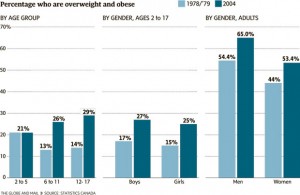I have read some articles recently on weight loss and the mechanisms both in scientific literature and popular media, and frankly, I can understand why so many of my patients are so confused.
A recent article was published in CNN Health entitled “Should all obese people lose weight?” , lending attention to two recent publications of large scale from the Canadian Medical Association Journal and Applied Physiology, Nutrition and Metabolism. The research studies identify the usefulness of an obesity staging scale, and whether individuals based on the rating they are scored on the scale should be paying closer attention weight management. Individuals scoring lower on the scale may not currently reveal all physical indicators for heart disease, diabetes, or stroke, and are thus not seen as a significant risk of mortality (or early death).
The implications of the CNN article are fairly concerning, as the original research articles themselves are directed more to clinicians who are having trouble determining when to truly push for change in their patients. Statistics Canada recently released the comparison of body mass between 1978 and 2011 of obese men, women, and children. As you can assume, the average weight of an obese or overweight individual has Canadian has grown, in some instances more than 15% in children.

While currently individuals with obesity or are very overweight may not experience vascular conditions due to their body mass such as heart disease, diabetes, or stroke, it does not necessarily mean that there is an increased risk of developing these health conditions. Good diet, regular exercise, and an appropriate understanding of the fat-muscle ratio for your body type should still be a priority.
For those of you with higher body mass than you would like and whom tirelessly attempt to improve your health, this commentary is not meant to upset or negate your good health practices. I merely would like to comment on the suggestion that being overweight is not related to negative health outcomes is perhaps slightly irresponsible. Research is only as good as the practical information to follow, and as the Edmonton Obesity Staging Scale is in its infancy, it may not be as useful or practical in practice as initial thought. Time will tell.
Stay tuned for a future post on the association with weight retention and cravings – the connection to stress and the hormone system in relation to weight gain.